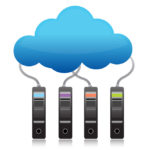Data is an essential part of daily life. You have a lot of data that has some type of value of importance, whether that be a project for work or school, family photos, tax documents, and more. How and where you store your important data matters. For this reason, many people use a professional data backup and recovery solution. Find out what a data backup is and find out why you may want to backup your important files.
Understanding Data Backup
Whenever you save digital files, those are known simply as a backup or archive. Saving your files to a device, like a computer, tablet, or smartphone, will ensure you have them for later, and they are accessible, but this may not be the safest plan. Studies show that every 53 seconds, a laptop is stolen, and each year 70 million smartphones are lost. If your device is lost, stolen, or compromised in any way, then your data may be gone, or it could fall into the hands of a cyber-criminal.
Saving additional copies of your documents may be a good idea just because accidents happen. Unfortunately, hackers stealing your data or holding it for ransom are real possibilities, but so are you accidentally deleting files you still need. Maybe you confused two files with similar names and deleted the wrong file, and if you only have one copy, this can be a huge problem. Stashing an extra copy on a separate data backup will ensure you still have your document. It may not be the most recent version, but it can allow you to recoup your data without recreating it from scratch.
Saving your files to a separate location will protect your documents if there is a problem with your device, if safety is compromised or if you accidentally delete files.
Making Sense of Data Backups
You have options when you backup important files. Each option offers different advantages and disadvantages, so you need to determine what best fits your needs. The primary factors when choosing a data backup solution are:
- Accessibility
- Space
- Cost
There When You Need Them
You can save the files to an easy-to-access location, like a Cloud storage service. A benefit of saving important files to the Cloud is that you can easily find and open your files anywhere. If you plan to work on a project or need a document, you can always find what you need whether you are at home, the office, or anywhere. Cloud storage also allows for easy collaboration to share appropriate files with coworkers or classmates, and every one can edit the file in real-time.
There are various Cloud storage services available, and each offers some degree of security to keep your information safe. It is vital to research a Cloud storage service before signing up and uploading your files. You want to understand the safety protocols in place and how your information will be protected.
Another option is to save your files to a separate device, like an external hard drive or a flash drive. A standalone device will further protect your documents from hackers, but you only have access to your files when you have the storage device in your possession. If you leave your flash drive at the office, you will not be able to access the files saved to it when you are at home.
Understanding Your Storage Needs
Space is often a significant factor when determining storage needs. If you intend to save spreadsheets, word files, and PDFs, then you will not need much space. A basic Cloud storage service that offers 15GB or a flash drive that can accommodate 32GB may be enough to address your needs.
Files that take up more space, like photos and videos, or if you have particularly large files, like manuscripts for a series of novels, then you may want to upgrade to more extensive storage. Cloud services can offer more space for a fee, and there are external hard drives that can hold 1TB or more.
You can be billed monthly or quarterly when you pay for Cloud storage, depending on the service. Purchasing an external hard drive or flash drive will incur a one-time expense. The type of files you are saving, the size of those files, and the cost of that storage will often guide your journey to finding the correct type of data backup to fit your needs best.
Save Your Data
A data backup is, at the end of the day, simply saved files. Data is critical, and you have so much information stored on your devices. Managing your files not only helps ensure you have the files you need when you need them, but it can also keep your information safe.
Understanding the value of data backup and how to pick the correct type of storage to best suit your needs can protect your digital files, and get you out of trouble when you least expect it.
Related Posts












